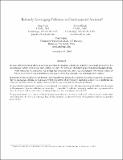| dc.contributor.author | Chen, Jing | |
| dc.contributor.author | Micali, Silvio | |
| dc.contributor.author | Valiant, Paul | |
| dc.date.accessioned | 2011-05-04T18:24:58Z | |
| dc.date.available | 2011-05-04T18:24:58Z | |
| dc.date.issued | 2010-01 | |
| dc.identifier.uri | http://hdl.handle.net/1721.1/62583 | |
| dc.description.abstract | Because of its devastating effects in auctions and other mechanisms, collusion is prohibited and
legally prosecuted. Yet, colluders have always existed, and may continue to exist. We thus raise the following
question for mechanism design:
What desiderata are achievable, and by what type of mechanisms, when any set of players who wish to
collude are free to do so without any restrictions on the way in which they cooperate and coordinate their
actions?
In response to this question we put forward and exemplify the notion of a collusion-leveraging mechanism. In
essence, this is a mechanism aligning its desiderata with the incentives of all its players, including colluders, to
a significant and mutually beneficial extent. Of course such mechanisms may exist only for suitable desiderata.
In unrestricted combinatorial auctions, where classical mechanisms essentially guarantee 0 social welfare and 0
revenue in the presence of just two colluders, we prove that it is possible for collusion-leveraging mechanisms to
guarantee that the sum of social welfare and revenue is always high, even when all players are collusive.
To guarantee better performance, collusion-leveraging mechanisms in essence “welcome" collusive players, rather
than pretending they do not exist, raising a host of new questions at the intersection of cooperative and noncooperative
game theory. | en_US |
| dc.language.iso | en_US | |
| dc.publisher | Institute for Theoretical Computer Science, Tsinghua University | en_US |
| dc.relation.isversionof | http://conference.itcs.tsinghua.edu.cn/ICS2010/content/paper/Paper_07.pdf | en_US |
| dc.rights | Creative Commons Attribution-Noncommercial-Share Alike 3.0 | en_US |
| dc.rights.uri | http://creativecommons.org/licenses/by-nc-sa/3.0/ | en_US |
| dc.source | MIT web domain | en_US |
| dc.title | Robustly Leveraging Collusion in Combinatorial Auctions | en_US |
| dc.type | Article | en_US |
| dc.identifier.citation | Chen, Jing, Silvio Micali, Paul Valiant. "Robustly Leveraging Collusion in Combinatorial Auctions" Symposium on Innovations in Computer Science, January 2010. | en_US |
| dc.contributor.department | Massachusetts Institute of Technology. Computer Science and Artificial Intelligence Laboratory | en_US |
| dc.contributor.department | Massachusetts Institute of Technology. Department of Electrical Engineering and Computer Science | en_US |
| dc.contributor.approver | Micali, Silvio | |
| dc.contributor.mitauthor | Chen, Jing | |
| dc.contributor.mitauthor | Micali, Silvio | |
| dc.contributor.mitauthor | Valiant, Paul | |
| dc.relation.journal | Symposium on Innovations in Computer Science (ICS) Proceedings | en_US |
| dc.eprint.version | Author's final manuscript | en_US |
| dc.type.uri | http://purl.org/eprint/type/ConferencePaper | en_US |
| dspace.orderedauthors | Chen, Jing; Micali, Silvio; Valiant, Paul | |
| dc.identifier.orcid | https://orcid.org/0000-0002-0816-4064 | |
| mit.license | OPEN_ACCESS_POLICY | en_US |
| mit.metadata.status | Complete | |
